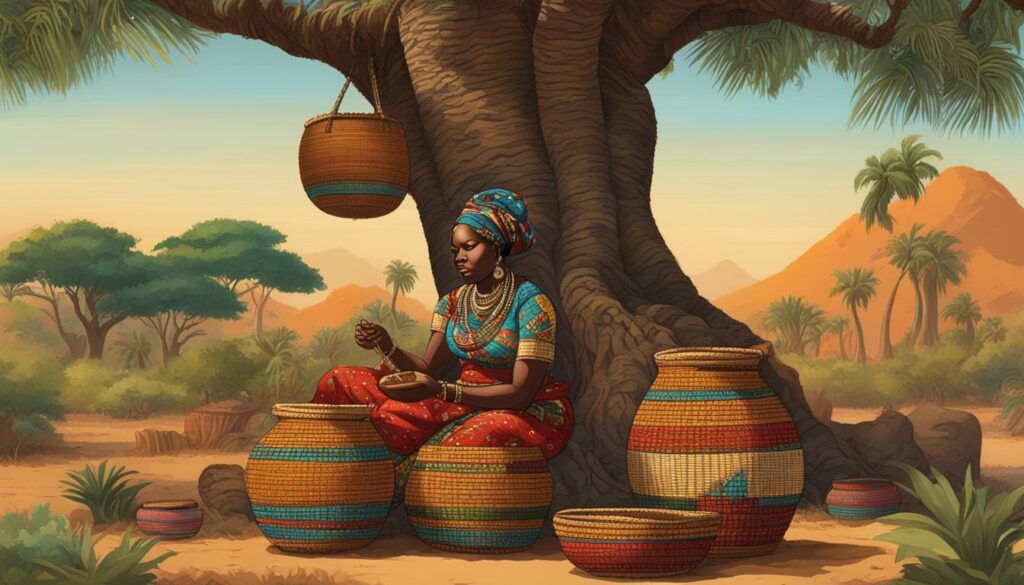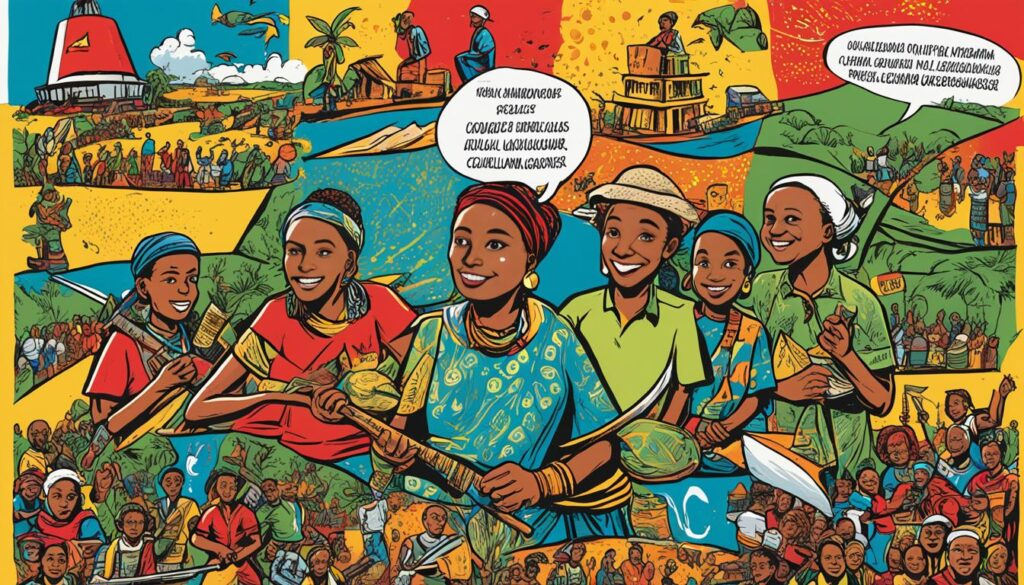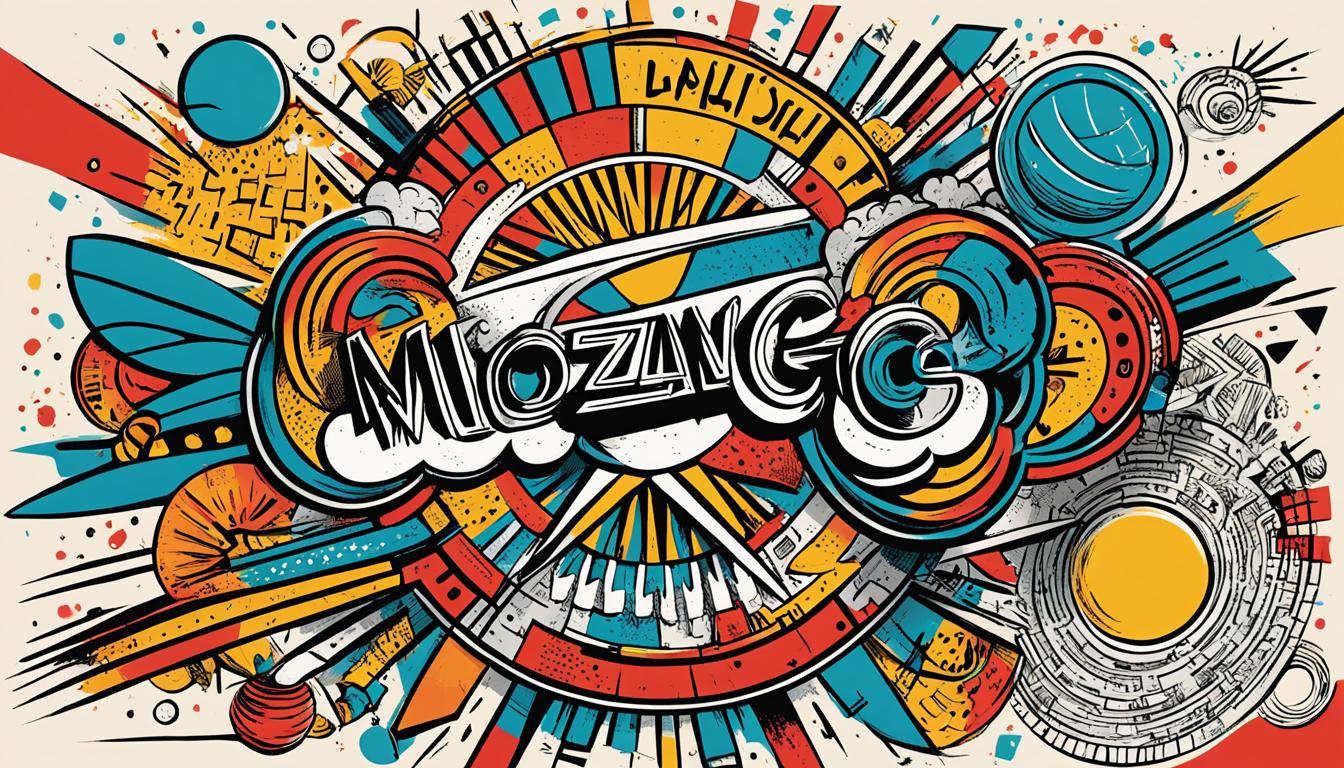Did you know that the Bitonga language is spoken by approximately 1.1% of the population of Mozambique? This intriguing statistic highlights the significance of this Bantu language in the country’s linguistic landscape and its impact on the Bitonga community. In this article, we will explore the fascinating aspects of Bitonga language, including its dialects, culture, history, and the challenges it faces for preservation. Join us on this linguistic journey to discover the rich tapestry of the Bitonga language and its importance in Mozambique.
Linguistics of Bitonga Language
The Bitonga language, also known as Gitonga or Guitonga, is classified as a Bantu language within the Niger–Congo language family. It belongs to the Atlantic–Congo, Benue–Congo, Bantoid, Southern Bantu, and Tonga branches.
Bitonga has its own unique grammar and vocabulary, making it distinct from other languages. This includes specific linguistic features such as phonetics, phonology, morphology, syntax, and semantics.
Bitonga dialects may exist within different regions. These dialects may vary in pronunciation, vocabulary usage, and grammar rules, contributing to the language’s richness and diversity.
To further understand and explore the linguistic aspects of Bitonga, various resources such as Bitonga dictionaries and linguistic studies are available. These resources provide valuable insights into the language’s structure, word formations, and meanings.
Bitonga Grammar
The grammar of Bitonga follows the typical Bantu language structure. It utilizes a system of noun classes, which categorizes nouns based on their characteristics and assigns specific agreement markers to other parts of speech that relate to them. This agreement system is an integral aspect of Bitonga grammar, determining grammatical patterns and concord between words in sentences.
Verbs in Bitonga also exhibit complex conjugation patterns, including tense, aspect, mood, and agreement with noun classes. The language employs various grammatical markers and affixes to express these features.
Bitonga Dictionary
A Bitonga dictionary is a valuable language resource for learners and researchers. It provides a comprehensive collection of the language’s vocabulary, including nouns, verbs, adjectives, adverbs, and other parts of speech. These dictionaries help individuals understand and communicate effectively in Bitonga.
It is essential to consult Bitonga dictionaries specific to the dialect or region of interest to ensure accurate and relevant linguistic information. Some notable Bitonga dictionaries include:
- Mozambique Bitonga Dictionary
- Inhambane Province Bitonga Dictionary
- Bitonga-English Dictionary
These dictionaries serve as valuable tools for language learners, linguists, and anyone interested in exploring and preserving the Bitonga language.
History of Bitonga Language
The history of the Bitonga language is deeply intertwined with the history of the Bitonga people in Mozambique. While specific oral traditions of the Inhambane Tonga have not been recorded, it is widely understood that they share a common history of migration from Central Europe that dates back to the time of Christ.
Over the centuries, the Bitonga people have embarked on various migrations, resulting in linguistic and cultural transformations within their communities. These migrations have shaped the development and evolution of the Bitonga language, reflecting the dynamic nature of the Bitonga people as they interacted with different cultures and regions.
“The Bitonga people have a rich history that spans centuries, marked by their resilience and adaptability. Their journey across different lands has influenced the linguistic and cultural aspects of the Bitonga language, making it a testament to the diverse heritage of Mozambique.”
While information about the exact historical events and cultural practices of the Bitonga people may be limited, the importance of the Bitonga language in preserving their identity and heritage cannot be overstated. This language serves as a bridge between past generations and the future, connecting the Bitonga people to their roots and reinforcing their sense of belonging.
Understanding the history of the Bitonga language provides valuable insights into the rich tapestry of Mozambique’s linguistic and cultural diversity. It highlights the ways in which language serves as a vessel for cultural expression, collective memory, and the preservation of heritage.
The Migration of the Bitonga People
The migration of the Bitonga people has played a significant role in shaping the history and linguistic landscape of Mozambique. Although specific details regarding their migratory patterns may vary, it is widely accepted that the Bitonga people originated from Central Europe.
As they moved southwards, the Bitonga people encountered different cultures and societies, leading to the adoption of new customs, traditions, and linguistic influences. This has contributed to the unique blend of cultural elements found among the Bitonga communities in Mozambique today.
| Key Events | Impacts on Bitonga Language |
|---|---|
| The migration from Central Europe | Introduction of new vocabulary, grammar structures, and linguistic features |
| Interaction with neighboring Bantu communities | Exchange of linguistic and cultural practices, resulting in mutual influences |
| Colonial era | Introduction of Portuguese language and cultural assimilation efforts |
| Independence and post-colonial period | Revitalization of indigenous languages, including the Bitonga language |
Through their migratory journey, the Bitonga people have contributed to the linguistic diversity and cultural heritage of Mozambique, enriching the nation’s identity as a whole.
Bitonga Culture and Community
The Bitonga language is not just a linguistic entity; it is an integral part of the vibrant Bitonga culture and close-knit community in Mozambique. The Bitonga people have their own unique customs, traditions, and social structures that contribute to the rich tapestry of their identity.
While limited information is available about the specific culture and customs of the Bitonga people, one notable aspect of their culture has gained international recognition – their exceptional skill in weaving baskets.
“The art of basket weaving is deeply ingrained in the Bitonga culture. It is a traditional craft that has been passed down through generations, showcasing the creativity and craftsmanship of the Bitonga people.”
Bitonga baskets are meticulously woven using a variety of natural materials, including grass, fibers, and palm leaves. The intricate patterns and vibrant colors of these baskets not only serve functional purposes but also carry symbolic meanings and reflect the cultural heritage of the Bitonga community.
The remarkable skill of Bitonga weavers has garnered international attention, with their baskets being sought after as unique pieces of art. Today, these beautifully crafted baskets are not only cherished within the Bitonga community but also recognized as valuable cultural artifacts worldwide.

The Bitonga culture and community are an essential part of Mozambique’s diverse heritage. Although more research is needed to fully understand their customs and traditions, the art of basket weaving stands as a testament to the creativity, craftsmanship, and cultural pride of the Bitonga people.
Bitonga and Other Languages in Mozambique
Mozambique is a multilingual country with a diverse linguistic landscape. While Portuguese is the official language and widely spoken, there are several Bantu languages spoken in the country, including Bitonga. Other indigenous languages spoken in Mozambique include Makhuwa, Sena, Tsonga, Lomwe, Shona, and many others. Additionally, other languages such as English, Swahili, and immigrant languages like Punjabi and Hindi also have a presence in Mozambique.
| Bantu Languages | Other Indigenous Languages | Additional Languages |
|---|---|---|
| Bitonga | Makhuwa | English |
| Sena | Sena | Swahili |
| Tsonga | Tsonga | Portuguese |
| Lomwe | Lomwe | Punjabi |
| Shona | Shona | Hindi |
Bitonga Language Demographics
The Bitonga language is primarily spoken by the Bitonga people in Mozambique. According to population data from 2001, there were approximately 237,780 people who identified as Bitonga speakers. This accounts for around 1.1% of the population of Mozambique. However, it is important to note that these figures may have changed since then, and updated data may provide a more accurate representation of the Bitonga-speaking population.

Key Demographic Insights:
- The Bitonga language is spoken primarily by the Bitonga people in Mozambique.
- According to 2001 population data, there were approximately 237,780 Bitonga speakers.
- This accounts for around 1.1% of the population of Mozambique.
Population Trends:
As with any language demographic, it is essential to consider the fluidity and potential changes in population numbers over time. Updated data is needed to provide a more accurate reflection of the Bitonga-speaking population in Mozambique.
Challenges and Preservation of Bitonga Language
Like many minority languages, the Bitonga language faces significant challenges in its preservation and vitality. With the dominant presence of Portuguese and the increasing influence of other languages, there is a risk of the Bitonga language losing ground and fading into obscurity.
However, there are dedicated efforts being made to preserve and revitalize indigenous languages in Mozambique, including Bitonga. Language education initiatives play a crucial role in raising awareness and providing resources for individuals to learn and use the Bitonga language. By equipping the younger generation with the skills to speak and write Bitonga, its future viability and relevance can be ensured.
In addition to language education, cultural initiatives also contribute to the preservation of Bitonga. Celebrating the unique aspects of the Bitonga community, such as their customs, traditions, and artistic expressions, helps to foster a sense of pride and connection to the language.
Community-led language preservation projects are also instrumental in maintaining the vitality of Bitonga. These projects involve collaboration between linguists, community members, and Bitonga speakers, working together to document and document the language’s grammar, vocabulary, and oral traditions. By actively involving the Bitonga community in these preservation efforts, the language remains alive and vibrant.
“Preserving the Bitonga language is not just about safeguarding words and grammar; it is about preserving a connection to our roots, our identity, and our heritage. It is our duty to ensure that future generations can enjoy the richness and beauty of Bitonga.”
Despite the challenges, the preservation and revitalization of the Bitonga language are essential for maintaining the cultural diversity of Mozambique and honoring the Bitonga community’s history and legacy.
In the table below, we highlight some of the key challenges faced by the Bitonga language and the corresponding preservation efforts:
| Challenges | Preservation Efforts |
|---|---|
| Limited usage and dominance of Portuguese | Language education initiatives, community-led projects |
| Decreasing number of fluent speakers | Language revitalization programs, cultural initiatives |
| Lack of comprehensive language resources | Development of Bitonga dictionaries and grammar guides |
By addressing these challenges through collaborative efforts and community engagement, the Bitonga language can be preserved for future generations, ensuring the Bitonga community’s language and cultural heritage endure.
Conclusion
The Bitonga language is an invaluable aspect of the Bitonga community in Mozambique, contributing to their cultural and historical heritage. Despite the challenges it faces, language preservation efforts play a crucial role in safeguarding the Bitonga culture and identity. Mozambique’s recognition of the importance of indigenous languages like Bitonga demonstrates a commitment to fostering inclusivity and embracing its linguistic diversity.
Preserving the Bitonga language is not only essential for the Bitonga people but also contributes to the vibrant tapestry of Mozambique’s linguistic landscape. By valuing and promoting the Bitonga language, Mozambique honors its linguistic heritage and ensures that future generations can connect with their roots and retain a sense of pride and belonging.
The Bitonga community continues to cherish their language as a source of unity and cultural preservation. Through language education programs, cultural initiatives, community-driven projects, and wider societal support, efforts are being made to sustain and revitalize the Bitonga language. These endeavors are crucial in maintaining the richness and diversity of Mozambique’s linguistic traditions.
FAQ
What is Bitonga Language?
Bitonga language, also known as Gitonga or Guitonga, is a Bantu language spoken in the Inhambane Province of Mozambique.
How is Bitonga language classified?
Bitonga language is classified as a Bantu language within the Niger-Congo language family, belonging to the Atlantic-Congo, Benue-Congo, Bantoid, Southern Bantu, and Tonga branches.
What is the history of Bitonga Language?
The history of Bitonga language is intertwined with the history of the Bitonga people in Mozambique, who have migrated over the centuries, leading to linguistic and cultural changes within their communities.
Is Bitonga language a part of Bitonga culture?
Yes, Bitonga language is not just a linguistic entity but also an integral part of the Bitonga culture and community.
What other languages are spoken in Mozambique?
Besides Bitonga, other languages spoken in Mozambique include Makhuwa, Sena, Tsonga, Lomwe, Shona, Portuguese, English, Swahili, and immigrant languages like Punjabi and Hindi.
How many people speak Bitonga language?
According to population data from 2001, there were approximately 237,780 people who identified as Bitonga speakers, accounting for around 1.1% of the population of Mozambique.
What challenges does Bitonga language face?
Like many minority languages, Bitonga language faces challenges in terms of preservation and vitality due to the dominance of Portuguese and the increasing influence of other languages.
How is Bitonga language being preserved?
Efforts are being made to preserve and revitalize indigenous languages in Mozambique, including Bitonga, through language education, cultural initiatives, and community-led language preservation projects.
